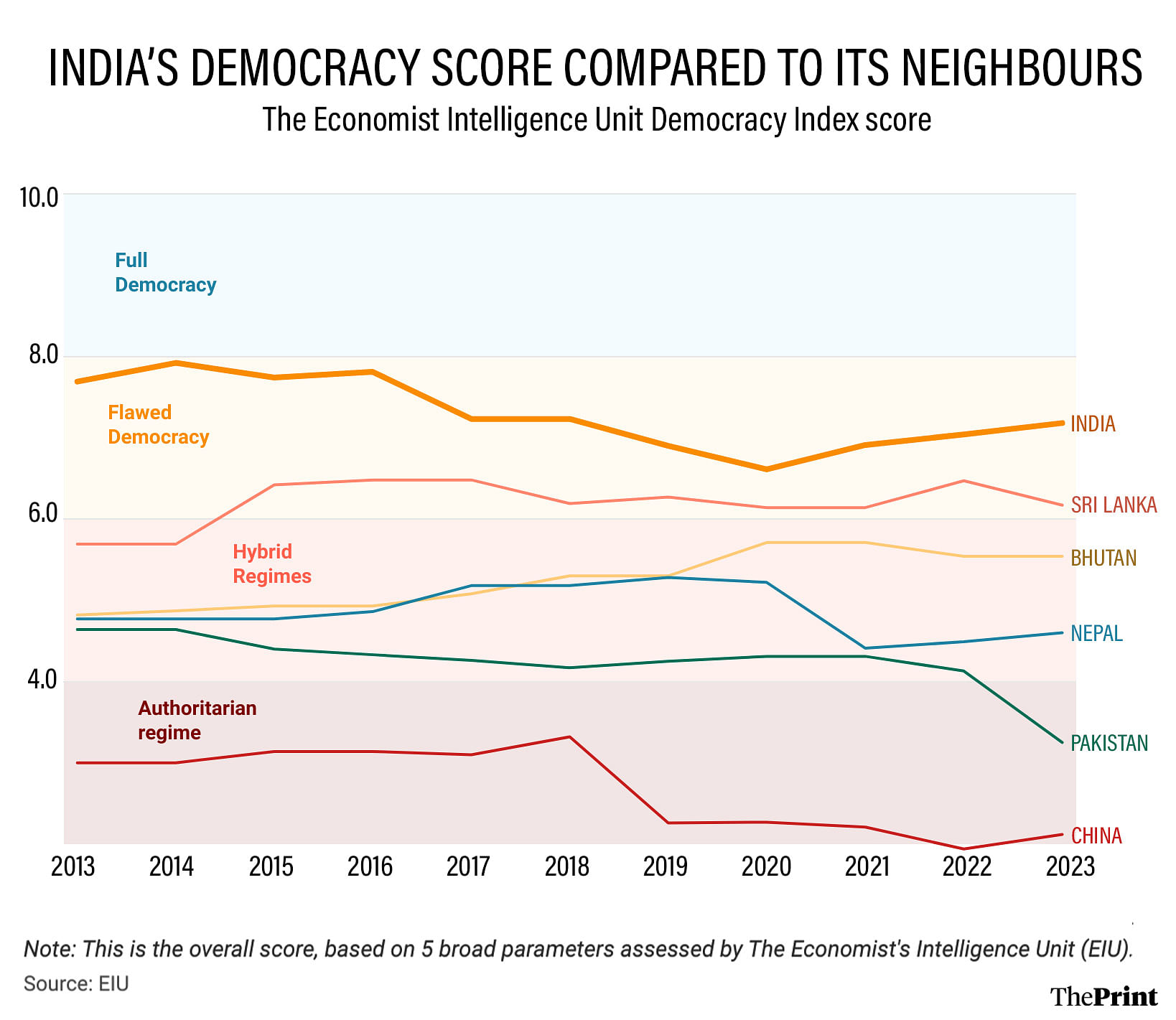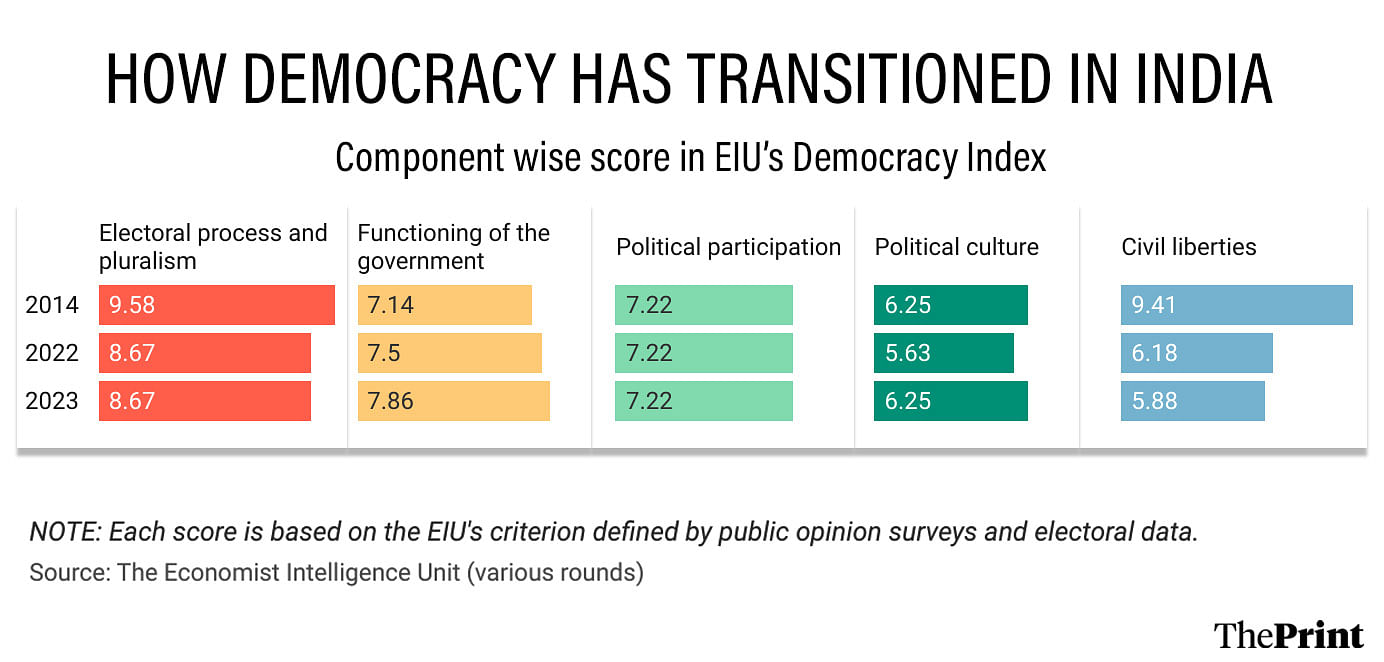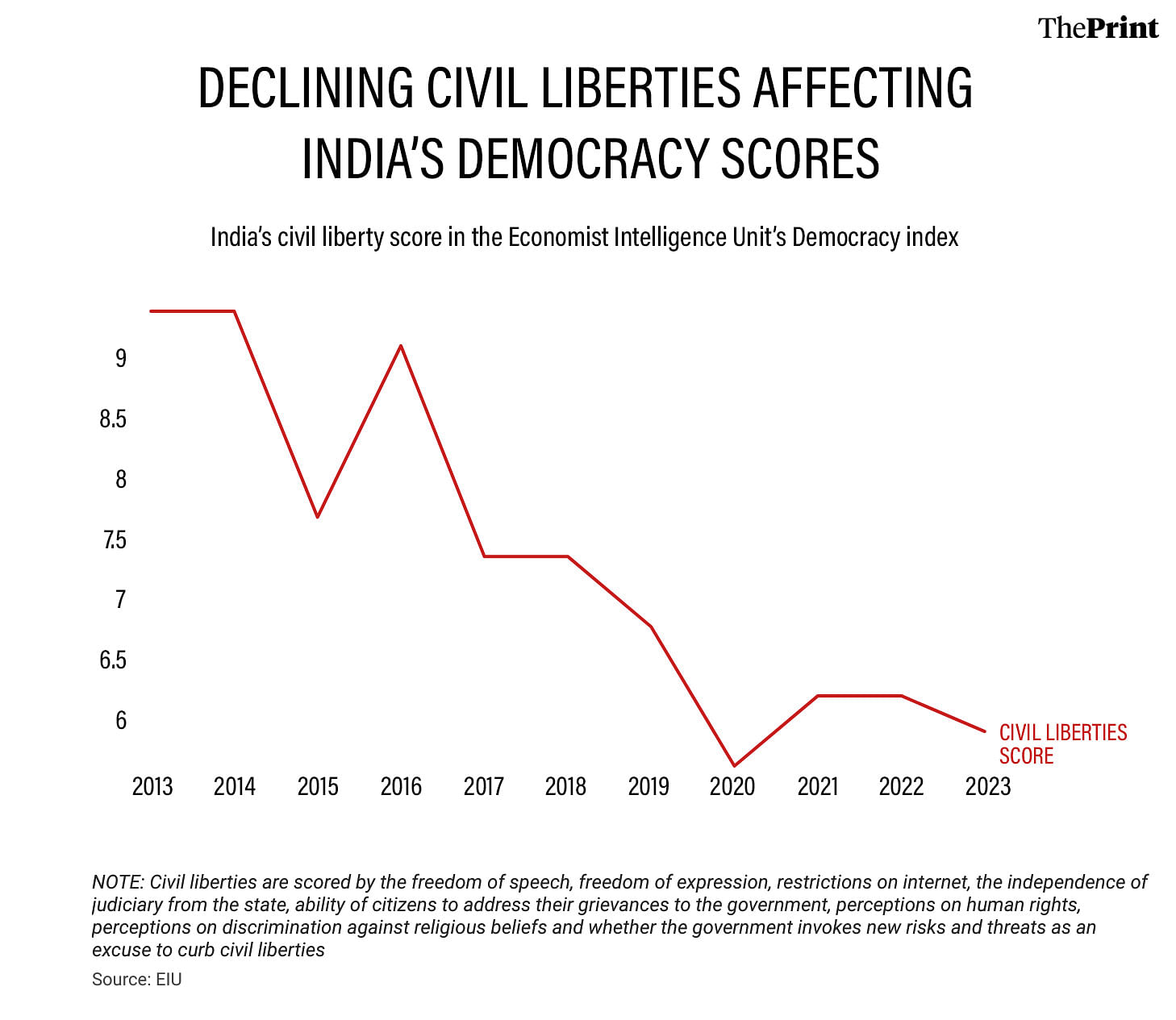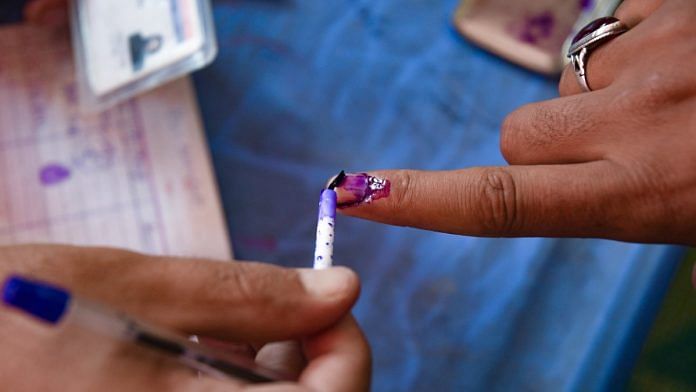Rome: At a time when critics of the Bharatiya Janata Party (BJP) government in India are alleging a sharp deterioration in India’s democratic fabric, an international index has found that the strength of India’s democracy has improved steadily over the last three years.
But these improvements, according to the Economist Intelligence Unit (EIU), only partially reverse India’s overall loss in the index since 2014 — the year Prime Minister Narendra Modi and his BJP swept to power.
EIU’s 2023 ‘Democracy Index’, published this month, shows that the improvements could seem to be driven by two parameters: ‘political culture’ and ‘functioning of government’.
On the other hand, there’s been a stark decline in India’s score on civil liberties.
While democracy can be subjective, EIU’s Democracy Index is based on five key indicators — electoral process and pluralism, functioning of the government, political participation, political culture, and civil liberties.
Based on these indicators, countries are given an overall score out of 10, where a score between 8-10 secures a full democracy tag, a score of 6-8 warrants the tag of a flawed democracy (which is where India’s score places it), 4-6 implies a hybrid regime, and 0-4 signals an authoritarian regime.
The indices are scored based on public opinion surveys (The World Value Survey), electoral participation data, and scores of the legislative and executive branches.
According to the EIU, India’s rank jumped by five positions from 46th in 2022 to 41st (tied with Poland) in 2023, out of a total of 167 countries. It also shows that India’s overall democracy score — based on five parameters — has steadily increased from 6.61 in 2020 to 6.91 in 2021, 7.04 in 2022, and 7.18 in 2023.

However, this rise only partially reverses the fall in India’s democracy score and rank since 2014 — India’s latest score is almost at par with what it was in 2017 and 2018 (approximately 7.2 each) and, even in terms of its rankings, India is back to 2018 levels at position 41. In 2014, India ranked 27 out of 167 positions and scored 7.92.
However, the EIU does acknowledge some limitations associated with these measures.
“Measures of democracy which reflect the state of political freedoms and civil liberties are not thick enough,” the EIU notes. “They do not encompass sufficiently, or, in some cases, at all, the features that determine how substantive democracy is.”
Also Read: India ‘largest flailing democracy’, says Hamid Ansari, talks of ‘growing authoritarianism’ globally
Where India improved
The index shows that in 2023, India’s democracy score has improved solely because of two of the five factors: ‘political culture’ and ‘functioning of government’.
The ‘political culture’ parameter is based on eight questions, which include perceptions of a “strong leader who bypasses Parliament and elections”, perceptions of military rule (whether people would prefer it), and perceptions of rule by technocratic or experts-led government, among other things. Of these, there’s inverse scoring for the ‘perceptions of a strong’ leader, where higher perceptions receive a lower score.
In 2022, India scored 5.63 on the political culture parameter, which jumped to 6.25 in 2023 — as high as it was when India’s ‘democracy’ score peaked in 2014.

Similarly, the ‘functioning of government’ has improved significantly to reach a score of 7.86 in 2023 from 7.5 in 2022. The score for 2023 is higher than what it was in 2014 (7.14).
For the functioning of government, the index takes into account 14 questions — ranging from public confidence in the government to pervasive corruption, effectiveness of the legislature, effective checks and balances on authority that the government exercises, and the influence of military and foreign powers in important functioning of the government.
‘Electoral process and pluralism’ is based on the questions around free and fair elections, the ability of citizens to form political parties, and the ability of citizens to form civic and political institutions without state surveillance. The score for political participation is based on various factors determining voting, citizens’ engagement with political parties, and the autonomy of ethnic and religious minorities.
In both these categories, India’s score has remained unchanged from 2022 at 8.67 and 7.22, respectively.
Declining civil liberties
Despite these improvements, India’s score on civil liberties was sharply lower than in 2014.
Civil liberties are scored by the freedom of speech, freedom of expression, restrictions on the internet, the independence of the judiciary from the state, the ability of citizens to address their grievances to the government, perceptions on human rights, perceptions on discrimination against religious beliefs, and whether the government invokes new risks and threats as an excuse to curb civil liberties.

This score was high for India in 2014 at 9.41 — close to what some of the Western world (Denmark, at rank 4 also had 9.41) had scored at that time and even higher than the United Kingdom (9.12), France (9.12), Germany (9.12) and the USA (8.53).
However, this score declined to 7.68 in 2015, a year after the Modi government was elected, but then it improved to 9.12 in 2016.
Since 2017, the civil liberties score has been in free fall. It was 7.35 in 2017 and 2018, then fell to 6.76 in 2019 and further to its lowest level in 2020 with a score of 5.59.
In 2021 and 2022, India’s civil liberties score was 6.18 and by 2023 it fell again to 5.88 — around the ranks of Ghana, Thailand, Ecuador, and Guatemala, all of which have a lower Democracy Index score than India.
While the developed countries have not seen their civil liberties scores improving during this time, India’s deterioration has meant it no longer scores above them on this parameter.
Nikhil Rampal is a visiting fellow at the CVoter Foundation and currently studies economics in Europe. He tweets at @NikhilRampal1.
(Edited by Uttara Ramaswamy)



